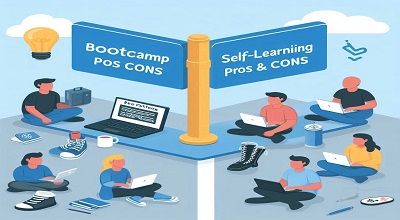Bootcamp vs. self-learning
Bootcamp vs. self-learning: When considering the best approach to learning new skills, especially in fields like software development, and data science. Or any other tech-related area, people often weigh the benefits of enrolling in a bootcamp versus self-learning. Each method has its own set of advantages and disadvantages, and the choice between them depends on individual learning styles, goals, and constraints. Here’s an updated look at the pros and cons of each approach based on current trends and experiences:
Bootcamps
Pros:
- Structured Curriculum: Bootcamps offer a well-organized and comprehensive curriculum that covers essential topics efficiently. This structure is especially beneficial for learners who prefer a guided path.
- Hands-on Learning: Many boot camps emphasize practical, project-based learning. Which can be invaluable for building a portfolio and gaining real-world experience.
- Networking Opportunities: Bootcamps often provide networking opportunities with peers, instructors, and potential employers through career fairs and alumni networks.
- Career Support: Most boot camps include career services like resume review, interview preparation, and job placement assistance, which can be crucial for career changers.
- Accelerated Learning: Bootcamps are designed to teach a significant amount of material in a relatively short period. Making them ideal for quickly gaining the skills needed for a new job.
Cons:
- Cost: Bootcamps can be expensive, with tuition ranging from a few thousand to over twenty thousand dollars, which may not be affordable for everyone.
- Time Commitment: The intensive nature of boot camps requires a significant time commitment. Often requiring full-time participation, which might not be feasible for those with other responsibilities.
- Quality Variation: The quality and effectiveness of boot camps can vary widely, making it important to research and choose a reputable program.
- No Guarantee of Employment: Despite the job placement assistance offered. Employment is not guaranteed after completion, and outcomes can vary by individual and market conditions.
Self-Learning
Pros:
- Flexibility: Self-learning allows individuals to learn at their own pace and on their own schedule, making it easier to balance work or personal commitments.
- Cost-Effective: Many resources for self-learning are free or low-cost, such as online tutorials. MOOCs (Massive Open Online Courses), and documentation, making it a more affordable option.
- Customizable Learning Path: Learners can tailor their studies to their specific interests and needs. Skipping over material they already know or diving deeper into topics of interest.
- Self-Discipline and Motivation: The self-learning process can cultivate strong self-discipline and motivation, skills that are highly valued in any professional setting.
Cons:
- Lack of Structure: Without a set curriculum, it can be challenging to ensure comprehensive coverage of all necessary topics, leading to potential gaps in knowledge.
- Limited Support: Self-learners lack the direct support and feedback that instructors or peers provide in a BootCamp. Which can slow progress when encountering difficult topics.
- Self-Motivation Required: Maintaining motivation can be difficult over time, especially without external deadlines or a supportive cohort.
- Networking and Job Assistance: Self-learners must seek out their own networking and job placement opportunities. Which can be more challenging without the built-in support system of a bootcamp.
Conclusion
Bootcamp vs. self-learning, the choice between bootcamp and self-learning depends on individual learning preferences, career goals, financial considerations, and the level of structure and support needed to succeed. Both paths can lead to success, especially when approached with dedication. A clear understanding of one’s learning style and objectives.
